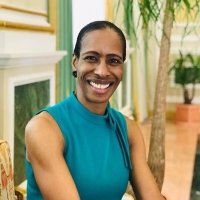Behind the Story: Black Journalists in Russia and Eurasia
From political unrest in Russia and Belarus to the recent conflict between Armenia and Azerbaijan, journalists in Russia and Eurasia are not at a loss for stories to report on. But the stories of journalists behind this reporting often goes untold. As part of the Kennan Institute’s Black History Month programming, journalists Yelena Khanga and Ann Simmons discussed their experiences of being black female journalists in the region, the challenges and opportunities they face, and the future of journalism for people of color who cover these regions.
Selected Quotes
Yelena Khanga
"I was born and raised in Moscow. I was a Komsomol girl, a Pioneer girl, so I went through every stage that any Russian person goes through. But I would look in the mirror, when I used to be a little girl, and I was asking the question, “Why I was Black? Why don’t I look like the rest of the world?” I wanted to look like the rest of the world as any kid does. In fact, I used to speak Russian with my grandmother who was American, and I would speak very loud so that everyone would hear me speaking Russian so there would be no mistake that I’m like everybody else. When I became older, we started gathering with other Black Russians, the descendants of other Americans, African Americans who came to the Soviet Union in the 1930s with my grandfather. There were five families, and we used to get together and talk. And the females, the young females, would say, “We have to marry someone who looks like us.” But there were not many people who looked like us [in Russia], and we were saying that we have to go back home. Well, we never knew what the word “home” was. Was it back in Africa? Is it home in America? Where is home? But we used to say, we will marry a person that has the same color of skin because only they will understand us."
"There is something in the mind of a Russian, probably not only Russians, but in the mind that lives together, lives united. On one side, they’re not racist. On the other side, the things you hear from officials on Russian television sometimes, it just blows your mind and you know there’s no way you can listen to that in any European [country] or even in America. But let me be clear, this is not against people of African heritage, this is more to people who are not Slavic-looking. This is, I would say, xenophobic more than racism, because we have lots of people from Uzbekistan, Tajikistan. These are former Soviet republics, and people [from there] look darker [...] and people experience a lot of, I don’t want to say the word discrimination, but they feel sometimes not comfortable [...] It’s based on some of their ways of thinking, which we cannot say it’s because they think that Black people are bad. No, it’s not because of that, but it’s about a lot of other small things that look like racism to Americans."
Ann Simmons
"When I came [to Russia] in the early 1980s, there were fewer people of color, but there were many African students who were from countries that were once on the road to socialism. And they were studying here, and a lot of them received large grants from the Soviet government and did quite well […] It was interesting because at that time, there was still a bit of antagonism towards African students, and I would say it was more unusual. People would stop and stare. I had that [experience]; there was a lot of curiosity, but also a lot of ignorance. There was also the veneer—and this could have at the time been Soviet propaganda—that everyone is equal here, and if you are an African student, you have as many rights as anybody else, and no one is to do anything bad to you, and that was actually something that everyone thought […] Fast forward to the 1990s, sometimes called the Wild West of Russia […] it was almost as if everything is kind of on the road to capitalism, we’ve got to try everything that we’ve never have had the opportunity to do before. But there was also a lot of gangsterism and banditry, and there was a rise of the far-right movement, and a lot of animosity towards people of color."
"People have become accustomed to seeing people of color. If you do go back into the hinterland, and when I’m reporting out there, there is a bit more curiosity, like if you go to remote parts of Russia or some of the other autonomous republics, or out to Siberia or Yakutia where people still want to take your photograph because they’re not used to seeing Black people. There is a lot more curiosity out there."
Speakers


Moderator

Hosted By

Kennan Institute
After more than 50 years as a vital part of the Wilson Center legacy, the Kennan Institute has become an independent think tank. You can find the current website for the Kennan Institute at kennaninstitute.org. Please look for future announcements about partnership activities between the Wilson Center and the Kennan Institute at Wilson Center Press Room. The Kennan Institute is the premier US center for advanced research on Eurasia and the oldest and largest regional program at the Woodrow Wilson International Center for Scholars. The Kennan Institute is committed to improving American understanding of Russia, Ukraine, Central Asia, the South Caucasus, and the surrounding region through research and exchange. Read more
